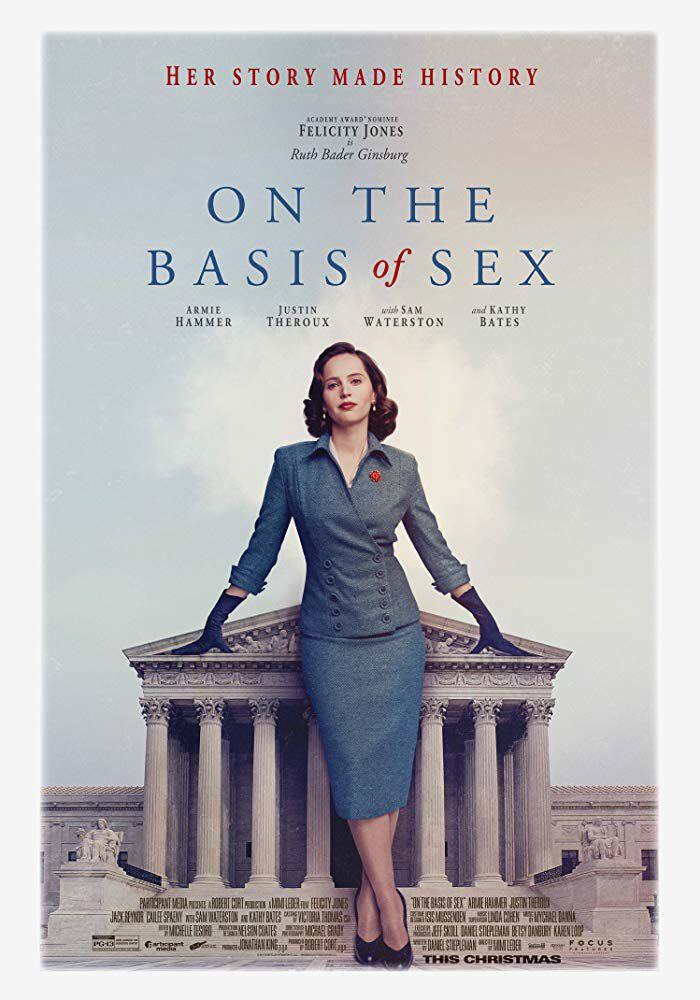Stars: 4/5
“On The Basis of Sex” focuses on the beginnings of Supreme Court Justice Ruth Bader Ginsburg’s prolific, world-changing career.
In 1956, Ruth Bader Ginsburg (Felicity Jones) is a first-year student at Harvard Law School. She’s one of the few women in her class of hundreds of men. She’s happily married to Martin Ginsburg (Armie Hammer), a second-year Harvard Law student, and mother to Jane (Cailee Spaeny).
When Martin falls ill with cancer, Ruth attends both her own and Martin’s classes during the day, then cares for her husband and Jane at night. Two years later, Martin accepts a job in New York. Ruth transfers to Columbia Law School where she graduates tied for top of the class. She struggles to find a job due to being a woman, eventually settling for a teaching position at Rutgers Law School.
In 1970, Ruth is disappointed with her career. Martin brings a tax case to her attention that discriminated on the basis of gender. Ruth deduces the case could potentially set a precedent on which she could build the change she desires to bring the world.
The title of the film itself is ironic. In real life, Justice Ginsburg’s secretary pointed out that the word “sex” would be too distracting, and suggested she replace it with “gender.” This is included in a scene in the film. The law itself states that discrimination on the basis of gender is unlawful. Yet, the film utilizes the word “sex,” presumably because sex sells and “On The Basis of Sex” has a better ring to it than “On The Basis of Gender.”
While the film covered important aspects of Ruth’s career, like all the sexism she faced and overcame in order to change the law so that gender would become a protected group, it’s so small in comparison to everything she has achieved. The film left me wanting more — more of the story and more of the battles she won and the misogynists she defeated along the way.
Felicity Jones is, unquestionably, a hard-working, talented actress, but I have to question the decision to cast her in the role. Jones is neither Jewish nor American. She had to work with a dialect coach to achieve a Brooklyn accent, which did not feel organic. I kept thinking of Rachel Brosnahan in “The Marvelous Mrs. Maisel” and how naturally she fit into the role. This wasn’t the case for Jones.
In addition, I found the contacts and teeth caps incredibly distracting, ridiculously unnerving and utterly unnecessary. It made the casting seem even more forced. A less known actress would have fit into the role more organically than Jones, but I understand the appeal of attaching an Oscar-nominated actress to the project, unnecessary as it may have been as Ruth Bader Ginsburg’s career would’ve been incentive enough for movie goers to want to see the film.
In contrast to Jones, Armie Hammer and Cailee Spaeny were ideal choices for Martin and Jane, respectively. Hammer plays the role of supportive husband so naturally that it’s hard to accept that he’s merely acting. Martin sees Ruthnot as subservient but as an equal.
Spaeny’s Jane is an intelligent, empowered young woman who does not let the expectations of the time be imposed on herself. The scene where she stands up to the constructions workers sexualizing and harassing her and her mother was particularly satisfying. She was a breath of fresh air from Jones’ uncomfortable Ruth.
Another actor who has cast to perfection is Justin Theroux, who plays ACLU president Mel Wulf. Wulf is at times supportive, at times sexist towards Ruth.He is fighting for equality yet is seemingly unaware of the sexist behavior he displays. Wulf wasn’t as fearless as Ruth, though he wanted to make change happen.
In the end, the film portrays a pivotal moment in the war for gender equality and women’s rights, a war that is still ongoing today. It is simply a must-watch, especially for my “I-don’t-like-to-read-so-I’ll-wait-for-the-film” people.





